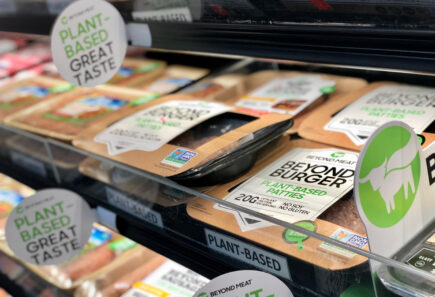
The First Amendment right to use clear labels on food
Some legislators and interest groups have launched legislative and regulatory attacks to censor the words that can be used on the labels of alternative proteins. These ill-conceived attacks are anti-competitive, patronizing to consumers, and ignore the First Amendment right of producers to describe their products in a clear manner consistent with consumer expectations.
Save this document
Protecting clear labeling for alternative proteins
Americans today enjoy a wide variety of foods that are alternatives to conventional animal products. Increasingly, for example, consumers are buying plant-based versions of meats, seafood, dairy products, and eggs, including meaty burgers made of proteins derived from peas or wheat, soy milk and nut cheeses, and scrambles that get their eggy flavor from mung beans. In fact, these products now garner eight billion dollars in sales annually.1
Consumers buy plant-based foods for a number of reasons—for example, to increase diet variety, reduce negative environmental impact, or for their attractive nutritional profiles. They find the products easy to incorporate into their lifestyles because plant-based meats, dairy products, and eggs can be used just as the conventionally produced products would be. Burgers go on buns with mustard and ketchup. Milks go on cereal and in coffee. And eggs can be scrambled or used in baking.
Clear labels communicate both of these important qualities to consumers: that these foods are plant-based and that they are functionally meats, dairy products, and eggs. But with consumers increasingly choosing alternatives to conventional animal products, some legislators and interest groups have launched legislative and regulatory attacks to censor the words that can be used on the labels of plant-based foods. And with cultivated meat and seafood — products made from genuine animal tissue grown from cells outside of the body of the animal — now greenlit for sale in the United States, some of these would-be censors have also claimed that terms like “beef” and “shrimp” should be banned from the labels of these products.
These ill-conceived attacks are anti-competitive and patronizing to consumers. But perhaps most critically, they ignore the First Amendment right of producers to describe their products in a clear manner consistent with consumer expectations.
Constitutionality
First Amendment jurisprudence makes clear that if the government intends to restrict corporate speech (e.g., by banning terms like “almond milk” and “veggie burger”), it must further a legitimate government interest. Privileging one industry over another does not qualify. The First Amendment safeguards not only the right of speakers to share truthful information but also the right of consumers to receive accurate commercial information.2
The Supreme Court’s decision in Central Hudson Gas & Electric Corp. v. Public Service Commission affirmed that commercial speech (such as words on labels) is protected by the First Amendment.3 The Court explained that the government can only restrict commercial speech when the restriction directly advances a substantial governmental interest.4 Moreover, the restriction must not be more extensive than necessary.5 The Court later clarified in Sorrell that content-based restrictions — which prohibit speech on the basis of its subject matter — are subject to heightened scrutiny.6
State bans prohibiting the use of certain words in food labels have been found to fail multiple prongs of the Central Hudson test.
In 2017, the Eleventh Circuit held that the state of Florida had violated the First Amendment when it told a creamery that it could not label its low-fat milk as “skim milk” without adding Vitamin A.7 The court found that the state’s restriction on the term “skim milk” was “clearly more extensive than necessary to serve its interest in preventing deception and ensuring adequate nutritional standards.”8
In 2021, the Northern District of California issued an order prohibiting the state of California from compelling Miyoko’s Kitchen to remove the term “butter” from the labeling of its “vegan butter” products.9 The court held that California could not enforce an order compelling Miyoko’s to remove the term “butter” from its labeling because the state could not show that doing so would advance its asserted interest in avoiding consumer confusion “to a material degree.”10
In 2022, the Eastern District of Arkansas granted a permanent injunction to Tofurky, preventing the state of Arkansas from enforcing a law against the company that prohibits selling “an agricultural product under the name of another food” or representing food as “meat” unless it was derived from “harvested livestock.”11 The Court held that the law unconstitutionally limits Tofurky’s First Amendment right “to convey meaningful, helpful information to consumers about the products they are purchasing.”12 The Court also admonished the State for failing to “come forward with evidence of any broad marketplace confusion around plant-based meat alternatives” that would justify applying the law to labels like Tofurky’s.13
In a less recent, but important, case, Kansas’s Artificial Dairy Products Act was struck down in 1987 on another constitutional grounds: preemption.15 There, the District of Kansas ruled that the state’s requirement that non-dairy or hybrid products be labeled “artificial” was an obstacle to accomplishing the federal Food Drug and Cosmetic Act’s purpose of ensuring customer clarity.16 Rather, meeting the law’s labeling requirements would provide “misleading and inaccurate information to consumers” by employing “the pejorative label ‘artificial dairy product.’”17
Consumer understanding
Many proponents of label censorship justify label restrictions as aimed at preventing consumer confusion. But there is no evidence to show consumers have a problem understanding plant-based meat and milk labels, and courts have roundly rejected the notion that using meaty and traditional dairy terms on these labels causes confusion.
The rising popularity of alternatives to conventional animal products demonstrates that Americans are making informed decisions based on their preferences, tastes, values, health concerns, and so on. Reasonable consumers do not mistake plant-based products for their conventional counterparts. A 2021 empirical study, for example, found that consumers are not confused by the use of descriptors like “burger,” “beef,” or “butter,” on products that also state they are “vegan” or “plant based.”18 Conversely, consumers would be more confused if companies used alternative phrases, such as “vegan spread” or “veggie patty,” to describe such products.19 Likewise, nearly all 800 respondents to a 2006 survey asking what soy milk is made of knew the product was not cow’s milk.20 In fact, in 2023, FDA expressly acknowledged that consumers are not confused by the use of the word “milk” on plant-based labels and that consumers prefer terms like “oat milk” and “almond milk” when referring to these products.29
The vast majority of courts considering the question have sided against litigants alleging that plant-based terms like “soy milk” or “veggie burger” are misleading:
- In 2013, private plaintiffs sued WhiteWave, the maker of Silk plant-based milks, alleging that the products were misbranded. Judge Samuel Conti ruled that the plaintiffs’ claim that consumers were deceived by names like “soy milk” and “almond milk” “stretches the bounds of credulity” and that “under plaintiffs’ logic, a reasonable consumer might also believe that veggie bacon contains pork, that flourless chocolate cake contains flour, or that e-books are made out of paper.”21
- In 2015, Judge Vince Chhabria dismissed allegations that Trader Joe’s had violated standards of identity (standardized definitions for a wide range of food products) by using the term “soymilk,” explaining that the fact that a standard of identity for milk exists, “does not categorically preclude a company from giving any food product a name that includes the word milk,” and that “Trader Joe’s has not, by calling its products ‘soymilk,’ attempted to pass off those products” as cow’s milk.22
- In 2017, Judge Stephen V. Wilson dismissed a lawsuit alleging that almond milk marketing was misleading on the basis that consumers falsely believed that almond milk had the same nutritional profile as dairy milk. “No reasonable consumer could be misled by Defendant’s unambiguous labeling and factually accurate nutrition statements,” his opinion read. “By using the term ‘almond milk,’ even the least sophisticated consumer would know instantly the type of product they are purchasing.”23 That conclusion was affirmed by the Ninth Circuit.24
- In the 2021 Miyoko’s decision, Judge Richard Seeborg found that the use of the term “butter” on Miyoko’s label was not inherently misleading even though the product did not fit within the federal definition of “butter,” noting that, “[q]uite simply, language evolves[,]” and federal food definitions do not necessarily reflect consumer understanding.26
- In the 2022 Tofurky decision granting a preliminary injunction against enforcement of Arkansas’ labeling restrictions, Judge Kristine Baker explained: “The State appears to believe that the simple use of the word ‘burger,’ ‘ham,’ or ‘sausage’ leaves the typical consumer confused, but such a position requires the assumption that a reasonable consumer will disregard all other words found on the label.25
The products involved in these cases are already called what they should be. As a practical matter, if label censorship efforts were successful, consumers would have to decipher vague, confusing, and in some cases, outright misleading phrases—e.g., “coconut liquid,” “almond beverage,” and “veggie tube.”
Prevalence and longstanding use of terms
Food names that include terms like “meat,” “milk,” and “butter” are common and have been for thousands of years (peanut butter and nut meat are examples). Humans have consumed plant-based milks and non-animal-based meats for centuries and across cultures. In the U.S., “soy milk” has been in commercial use since the 1940s and appears in USDA materials dating back to the early 1960s. The specific phrase “almond milk” appears in texts from the Middle Ages.27 According to Merriam-Webster, the word “meat” means food and nourishment and dates back to the Middle Ages; the specific denotation referring to animal flesh is not even listed in the first two definitions of the term.28 The long history of countless types of foods carrying these names underscores how desperate (and more than a little silly) it is for governments to legislate the meaning of everyday words.
Conclusion
Labeling restrictions banning or unduly restricting the use of common terms in food labels raise serious constitutional issues, put the government in the untenable role of picking winners and losers in the marketplace, and are poised to cause rather than mitigate consumer confusion. Organizations that care about liberty and free markets should oppose such restrictions, and governments should work to ensure fair labeling that allows consumers, not politicians, to shape the marketplace.
References
- The Good Food Institute, U.S. Retail Market Data for the Plant-Based Industry, available at https://gfi.org/marketresearch (November 30, 2021).
- Va. State Bd. of Pharmacy v. Va. Consumer Council, 425 U.S. 748, 757 (1976).
- See generally Cent. Hudson Gas & Elec. Corp. v. Pub. Serv. Comm’n of N.Y., 447 U.S. 557 (1980).
- Id. at 564.
- Id.
- Sorrel v. IMS Health Inc., 564 U.S. 552, 565 (2011).
- See generally Ocheesee Creamery LLC v. Putnam, 851 F.3d 1228 (11th Cir. 2017).
- Id. at 1240.
- Miyoko’s Kitchen v. Ross, No. 20-cv-00893, 2021 WL 4497867 (N.D. Cal. Aug. 10, 2021).
- Miyoko’s Kitchen, 2021 WL 4497867 at *5-6.
- Turtle Island Foods SPC v. Soman, 632 F. Supp. 3d 909, 939 (E.D. Ark. 2022).
- Id. at 935.
- Id. at 575.
- See generally Comm. for Accurate Labeling and Marketing v. Brownback, 665 F.Supp. 880 (D. Kan. 1987). More recently, Oklahoma’s “Meat Consumer Protection Act” has been challenged on federal preemption as well as other grounds. See Amended Complaint for Declaratory and Injunctive Relief, Plant Based Foods Assoc. et al. v. Stitt et al., No. 5:20-cv-00938 (W.D. Ok. filed Nov. 9, 2021). Other state laws restricting plant-based and cultivated meat labels may also be vulnerable to preemption challenges. See Robert Hibbert & Amaru Sanchez, State Meat Label Restrictions Face Preemption Challenges, Law360, Mar. 6, 2019, https://www.law360.com/articles/1135648/state-meat-label-restrictions-face-preemption-challenges.
- Brownback, 665 F. Supp. at 885.
- Id. at 884-85.
- Jareb A. Gleckel, Are Consumers Really Confused by Plant-Based Food Labels? An Empirical Study, J. of Animal & Envtl. Law, Vol. 12, No. 2, pp. 22-24 (Spring 2021).
- Id.
- Good Food Institute, Citizen Petition, FDA-2017-P-1298, Attachment A: Soyfoods Association of North America, Summary of Consumer Research, https://www.regulations.gov/document?D=FDA-2017-P-1298-0001.
- Ang v. Whitewave Foods Co., Civ. No. 13-1953, 2013 WL 6492353, at *4 (N.D. Cal. Dec. 10, 2013).
- Gitson v. Trader Joe’s Co., Civ. No. 13-1333, 2015 WL 9121232, at *1-2 (N.D. Cal. Dec. 1, 2015) (regarding the specious claim that consumers will assume animal products (e.g., cow’s milk) and their plant-based counterparts (e.g., soy milk) are nutritionally equivalent, the ruling noted that consumers “would not assume that two distinct products have the same nutritional content” and could easily consult a label).
- Painter v. Blue Diamond Growers, Civ. No. 17-2235, 2017 WL 4766510, at *2 (C.D. Cal. May 24, 2017).
- Painter v. Blue Diamond Growers, Civ. No. 17-55901, 757 Fed. Appx. 517 (9th Cir. Dec. 20, 2018).
- Turtle Island Foods, 632 F. Supp. 3d at 935.
- Miyoko’s Kitchen, 2021 WL 4497867at *4.
- Kemper, Benjamin, Nut Milks are Milk, Says Almost Every Culture Across the Globe, Smithsonian Magazine (August 15, 2018).
- Meat. Merriam-Webster.com, https://www.merriam-webster.com/dictionary/meat (accessed November 30, 2021).
- U.S. Food and Drug Administration, Labeling of Plant-Based Milk Alternatives and Voluntary Nutrient Statements: Guidance for Industry, 2023


